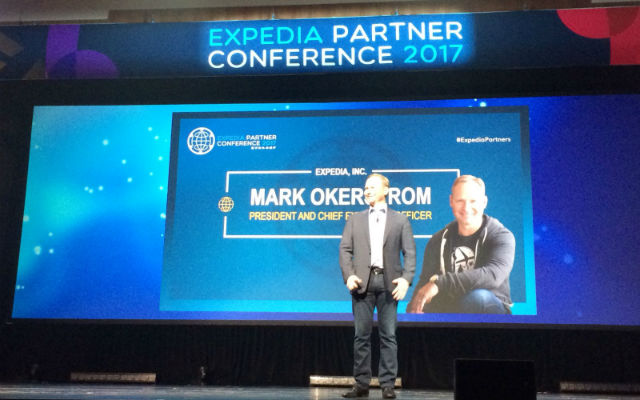Reporting from Expedia Partner Conference 2017, Las Vegas
A combination of robust growth in global travel and a digital revolution sees Expedia’s new CEO Mark Okerstrom being hugely optimistic of the company’s future despite its recent stock plunge and a third-quarter loss of US$8 million.
Addressing more than 5,000 partners attending Expedia Partner Conference 2017 in Las Vegas, Okerstrom trained their eyes on the longterm and what Expedia intends to do to grow.
He outlined three priorities: harnessing the local markets Expedia is already in rather than expanding into new ones, being more customer-centric and speeding up the pace of innovation.
The basis of Expedia’s new priorities under Okerstrom, who replaced Dara Khosrowshahi as CEO on August 29, is the combination of continued growth in travel and the digital revolution. In an “act of defiance” against terrorism, travel bans, natural calamities, people are travelling more than ever before, he said, chalking up US$1.6 trillion in travel spend in 2017 and growing six per cent year on year. International markets are growing, with countries like China, Indonesia and India showing absolutely phenomenal growth rates and bypassing laptops straight to mobile which has everything they need.
“So more innovations (are needed). The shift to mobile is almost old news now. We’re moving into voice, chatbots, machine learning, artificial intelligence and driverless cars,” he said.
On being global but locally relevant, Okerstrom said: “The land grab for being present across the world is largely complete and it’s time to turn our attention to be locally relevant in every market,” he said.

If it’s Malaysia, that means having all the local inventory, including places where Malaysians go for the weekend, being translation-perfect and speaking in their tone of voice, so “you feel you are actually working with a Malaysian travel agency”, said Okerstrom.
Expedia also recognised the need for Expedia to be more customer-centric. “In the first 10 to 20 years of travel, we’ve taken the green screen of the GDS, turning around to customers saying ‘here, you do the research, you book’, and we’ve gone from desktop to mobile,” he said.
The future sees the task going back to Expedia to anticipate customer needs. He cited an example of notifying a family while they are still in the air that they have missed their connection, re-booking them on a different flight, taking care of their accommodation needs. Egencia, the group’s corporate travel management company, is already doing this. “We want to bring more of this to leisure travel,” said Okerstrom.
Or, getting much closer to personalisation using artificial intelligence to help customers find the perfect trip. He said he takes two trips a year, one during the February school break and the other in August with a group of friends, always in the same destination and hotel – he’s just waiting for an email from Expedia recommending something different based on the use of artificial intelligence.
In man versus machine, so far man has won. In future, machines can win, he said, and Expedia wants to speed up the pace of innovation internally, he said.
But it’s no longer OTAs innovating on one side, then talking to partners, he said. The future is about joint innovations, joint success. “We are better together. You with us, we’re unstoppable.”
He said since 2010, some US$62 billion funding has been put into travel technology, half of that in the last two years. Since 2005, there have been 1,500 digital travel startups, fewer than 100 a year, but last year there were almost 250. “The pace of change is absolutely accelerating. Of course Expedia, and you, are a part of that,” he said.
Okerstrom’s address was followed by senior Expedia executives spotlighting ‘better together’. Ariane Gorin, senior vice president Expedia Affiliate Group Brand, used a Formula One analogy. In F1, the driver gets the attention, decides when to accelerate, when to overtake the competition. The race cars are masterpieces with the power to thrust them forward, and the team is the support before and during the race. “You our partners are always in the driver seat. Marketing campaigns and our platforms are the race cars and the team are the engineers that support the race – all are truly better together,” she said.
Scott Jones, Expedia vice president design and user experience, demonstrated how Expedia Innovation Lab tries to understand what customers want through electromygography. Planning travel is one of the most complicated, joyless tasks because of the time, money, uncertainties if it’s the right travel experience, plus it can’t be returned unlike other online purchases, he said. Planning isn’t the trip, making moments and memories is the trip. “There’s more we can do to put more anticipation and aspiration into experiences. I do believe we can make better memories together. We got the technology, we can mine it,” he said.
In outlining the massive growth of travel and how Expedia is positioning itself to harness that growth, Okerstrom indirectly addressed the concern of Expedia’s stock plunge and earnings loss, which it had described as short term arising from the impact of hurricanes and earthquakes, increased marketing spend at Trivago and increased technology costs at HomeAway.




















